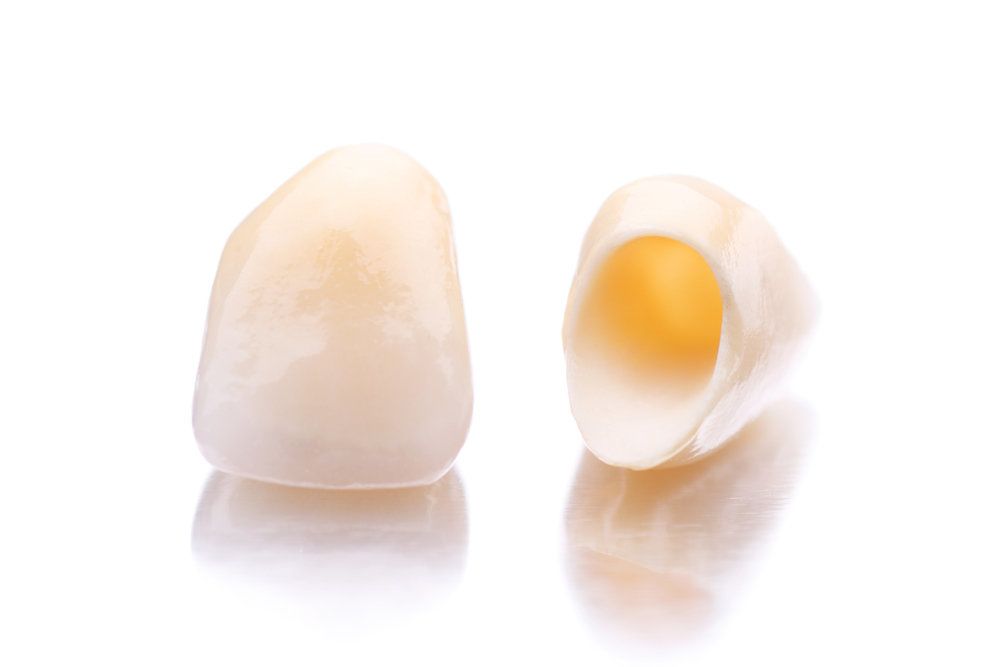Types of Dental Crowns
Dental crowns are cap-shaped restorations designed to resemble a natural tooth. The purpose of a crown is to improve the health, structural integrity, and appearance of a decayed or otherwise damaged tooth. If a tooth has a failing filling or has undergone root canal therapy, placing a crown can protect and strengthen its structure. Crowns can also provide a strictly cosmetic enhancement. In order to replace missing teeth, a crown may be attached to a dental implant or support a dental bridge. There are several different types of dental crowns, made using various techniques and materials. Your dentist will recommend the best option based on your oral health, aesthetic goals, and budget.

Made of advanced and lifelike materials, porcelain crowns are nearly indistinguishable from natural teeth.
Temporary vs. Permanent Crowns
A temporary crown is often made in the dentist’s office. Temporary crowns are placed to maintain a patient’s appearance and minimize sensitivity until a permanent crown can be created in a laboratory. In order to design both temporary and permanent customized crowns, the dentist will take either traditional or digital impressions. The dentist may also take photographs of the patient’s teeth or use a shade guide to provide further information to the lab technicians. This will ensure the new crown looks completely natural.
Same-Day Crowns
In some cases, your dentist may be able to place a same-day crown. Using computer-aided design and computer-aided technology (CAD/CAM) systems such as CEREC®, a growing number of practitioners offer this convenient option. Patients will not need to receive a temporary and the crown can be milled on-site while they wait. Same-day crowns are made from blocks of durable dental porcelain.
Choosing the Right Material
Once your dentist determines a crown is the best way to restore or enhance your smile, you can discuss the benefits and drawbacks of each available material.
Porcelain Crowns
All-porcelain crowns are typically recommended to restore or enhance the front teeth because they offer superior aesthetics.
Crowns made entirely of porcelain or ceramic are preferred for the front teeth because they offer superior aesthetics. These materials are translucent, just like natural enamel, and can be precisely shaded. All-ceramic restorations lack the strength and durability of metal crowns. They also tend to be the most expensive type of crown.
Metal Crowns
Gold and other types of alloys may be recommended for the molars. In addition, stainless steel crowns are often used for pediatric patients whose baby teeth require protection from further deterioration or decay. Metal crowns are extremely resistant to wear and tear from chewing and biting, and they tend to last longer than other materials. The biggest drawback is their appearance because metal is easily visible against tooth enamel. For this reason, metal crowns are typically placed in the back of the mouth.
Porcelain-Fused-to-Metal Crowns
Porcelain-fused-to-metal (PFM) crowns offer some of the best features of all-porcelain and all-metal crowns. The porcelain that coats PFMs can be matched to the surrounding teeth, so they blend naturally into patients’ smiles. The metal present in PFMs makes them stronger and more durable than all-porcelain crowns, so they are often incorporated into dental bridges. Unfortunately, some patients develop a dark line at the base of these crowns as the metal ridge becomes more visible if the gums recede.
Learn Which Crown is Right for You
Although crowns used to last anywhere from five to 15 years, newer dental materials have improved their lifespan. With proper care, some crowns can last 20 years or more. To ensure the longevity of a crown, you should always practice good dental hygiene, brushing at least twice a day and flossing daily. You should also visit the dentist for checkups and cleanings twice each year so they can check the integrity of the restoration. If you think you may benefit from a dental crown, speak with your doctor to learn which type can best meet your unique needs.
